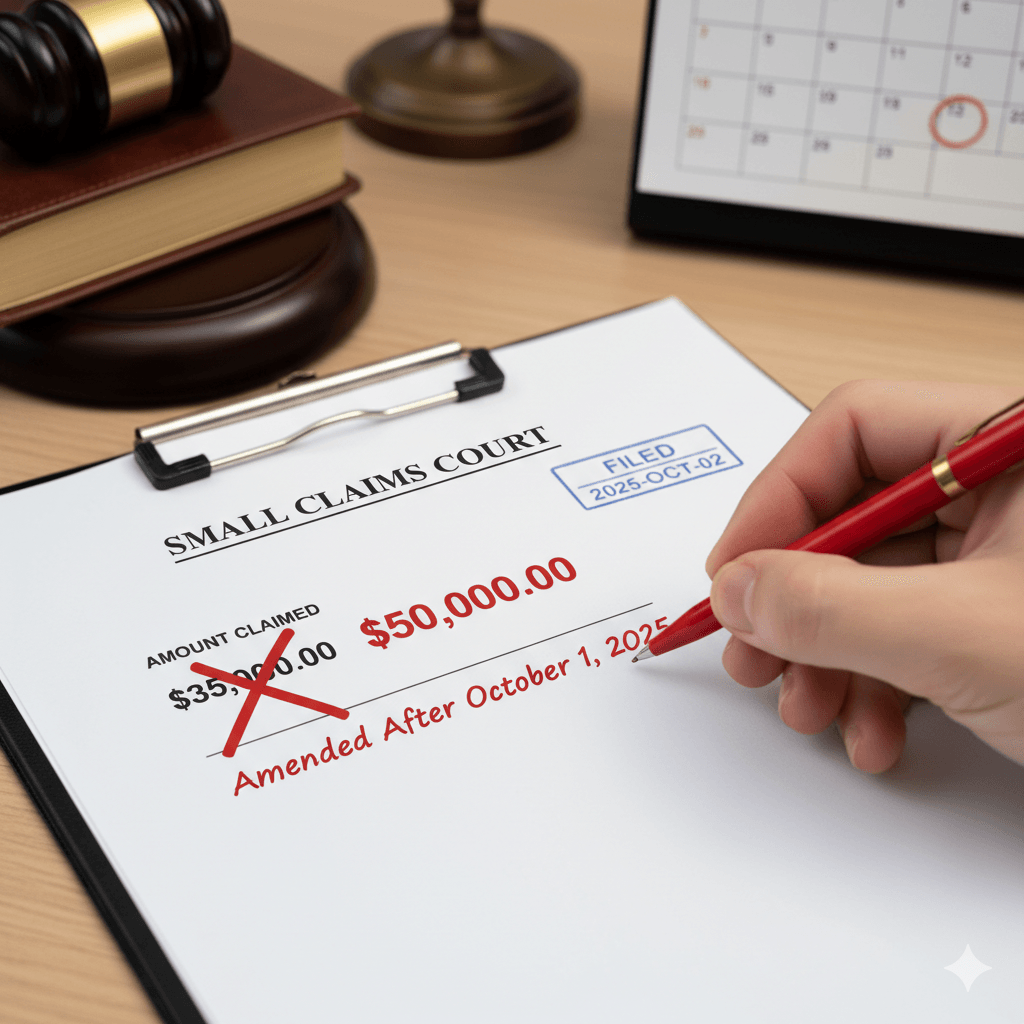Ontario’s Small Claims Court is about to undergo a major change. On October 1, 2025, the court’s monetary jurisdiction will increase from $35,000 to $50,000. This raises an important question:
👉 If you already filed a claim for $35,000, can you increase it to $50,000 once the new limit comes into effect?
The answer is yes — with conditions. Let’s break down how this works under Ontario law.
The Monetary Jurisdiction of Ontario Small Claims Court
The monetary limit of Ontario’s Small Claims Court is set by regulation under the Courts of Justice Act.
Currently, the cap is $35,000, as set out in O. Reg. 626/00.
Effective October 1, 2025, the limit increases to $50,000, based on O. Reg. 42/25.
This means that after October 1, 2025, you can start (or continue) a Small Claims action for up to $50,000, plus interest and costs.
Amending a Claim: Rule 12.01
The Rules of the Small Claims Court govern how claims can be changed. Rule 12.01 is key here:
Amendment without leave: A plaintiff may amend a claim at any time before trial, as long as the amendment is filed and served at least 30 days before the scheduled trial date.
Amendment with leave: If you’re within 30 days of trial, you’ll need the court’s permission to amend.
Service requirement: The amended claim must be served on all parties in accordance with Rule 8.
Formality: The amended pleading must clearly show what has changed (e.g., by underlining or marking “Amended”).
Can You Increase a $35,000 Claim to $50,000?
Here’s how the rules apply after October 1, 2025:
Yes, you can — within the new limit
Once the limit increases, existing plaintiffs may amend claims to increase damages up to $50,000.
You must follow Rule 12.01
If more than 30 days remain before trial → you can file and serve an amended claim without leave.
If less than 30 days remain → you must seek leave of the court.
The increase must be supported by evidence
You cannot simply inflate your damages. The additional amount must reflect actual losses supported by facts, contracts, invoices, or other evidence.
Prejudice to the defendant matters
Courts will not allow an amendment that unfairly surprises or prejudices the defendant. If prejudice can be addressed (for example, by costs or adjournment), the amendment may still be allowed.
Type of relief must remain within Small Claims Court
Even at $50,000, the court only hears claims for money or recovery of personal property. Other remedies (like injunctions or declarations) remain outside its jurisdiction.
Practical Example
Suppose you filed a Small Claims Court action in June 2025 for $35,000 in unpaid invoices. After October 1, 2025, you realize the customer owes you another $12,000 under the same contract.
If your trial is scheduled for December 2025 → you can file and serve an amended claim in October or November (more than 30 days before trial).
If your trial is in mid-October 2025 → you’ll need to bring a motion for leave to amend, explaining why the increase is justified and how the defendant will not be unfairly prejudiced.
Key Takeaways
On October 1, 2025, the Ontario Small Claims Court limit increases to $50,000.
Plaintiffs with pending $35,000 claims may amend upward to $50,000, as long as they comply with Rule 12.01.
Amendments are straightforward if made more than 30 days before trial. Within 30 days, leave of the court is required.
Any increase must be based on facts and evidence, not arbitrary numbers.
The amendment should not unfairly prejudice the defendant; if it does, the court may impose conditions or refuse.
Conclusion
Yes — after October 1, 2025, a plaintiff who originally filed for $35,000 may amend the claim to seek up to $50,000, provided the procedural rules are followed and the evidence supports the higher claim.
This change improves access to justice by allowing more substantial disputes to stay within Small Claims Court, which is faster, less formal, and more cost-effective than the Superior Court.
Please note these materials have been prepared for general information purposes only and do not constitute legal advice. Readers are advised to seek legal advice by contacting Frank Feldman regarding any specific legal issues.
All content is provided for general information purposes only and does not constitute legal advice. No communication shall result in a retain of Frank Feldman Law unless confirmed in writing.
